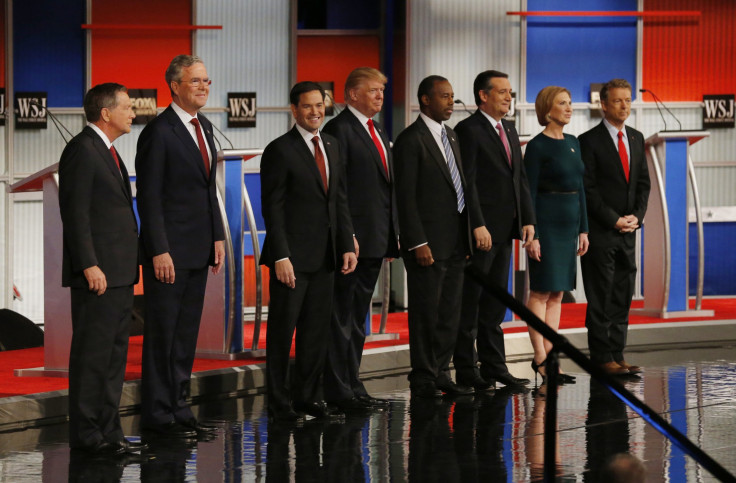Obama ISIS Speech: GOP Responses From Trump, Paul, Fiorina, Rubio, Bush, Kasich, Graham And Pataki

The Republican response to President Barack Obama's speech on the Islamic State group was swift. The rare, prime-time speech from the Oval Office on Sunday outlined the administration's response to the threat of the group known as ISIS. Soon after its conclusion, the speech was criticized by several 2016 candidates, highlighting the continued partisan divide over Obama's response to the Syrian civil war and recent terror attacks, and also revealing sharp differences among factions of the GOP.
Donald Trump, who is currently leading in Republican primary polls, responded to the president's speech on Twitter by retweeting what he said were the best tweets from other sources. One, from user homefreeee, said Obama needed to halt the entire visa system rather than just re-evaluate it.
Trump expressed disappointment with the length of the speech, which started at 8.00 p.m. EST and concluded at 8:15 p.m. EST.
Is that all there is? We need a new President - FAST!
— Donald J. Trump (@realDonaldTrump) December 7, 2015Trump slammed Obama for refusing to say that the country is at war with "radical Islamic terrorists."
Carly Fiorina, the Republican candidate and former CEO of Hewlett-Packard, was equally unimpressed.
Vintage Obama: No strategy, no leadership. Politics as usual.
— Carly Fiorina (@CarlyFiorina) December 7, 2015Florida Sen. Marco Rubio, speaking from Miami on Fox News soon after the speech, described the president's coalition of countries committed to fighting the group as "absurd." Stressing the growing threat of the terrorist group, Rubio said: "We can defeat them if we employ the power of the U.S. with a true coalition around the world."
Rubio also called for increased surveillance efforts -- a view likely to be opposed by Sen. Rand Paul and the Libertarian wing of the Republican party, which would rather see the government's data-collecting efforts reduced. "We need to be able to gather more intelligence, not less intelligence," Rubio said.
Rubio pointed to the shootings Wednesday in San Bernardino, California, as an example of domestic terrorism that could be combated with stronger gathering powers. "I think it's the right position to take for the future of our country," he said, adding some Republicans may disagree with his views.
Sen. Paul of Kentucky, in an interview on Yahoo News, said he believed in a strategy focused on supporting Islamic groups that oppose ISIS rather than solely on combat measures. "It has to be Islam," he said.
Ohio Gov. John Kasich said in a statement on his website that the president's strategy was "not enough" and called for "bolder action across the board," including forming a coalition that would take "the fight to ISIS on the ground."
"Our rights aren’t the problem, our unwillingness to act to defeat extremists is the problem,” Kasich said in the statement.
Sen. Ted Cruz, R-Texas, dismissed Obama's plans and promised, if elected president, to "shut down the broken immigration system" and "direct the Department of Defense to destroy ISIS."
And I will shut down the broken immigration system that is letting jihadists into our country. https://t.co/CpjCljVN5H
— Ted Cruz (@tedcruz) December 7, 2015Jeb Bush was also critical of the president's speech and called for a "wartime Commander in Chief" and the need to remove the "self-imposed constraints" placed by Obama on the country's intelligence services and military.
This is the war of our time. It shouldn’t be business as usual. My response to @POTUS' weak Oval Office Address: pic.twitter.com/PvHKfVJqzC
— Jeb Bush (@JebBush) December 7, 2015Here are some more reactions on Twitter from GOP presidential hopefuls:
President Obama is intentionally misleading the nation about the threat we face from ISIL.
— Lindsey Graham (@GrahamBlog) December 7, 2015President Obama is also overselling the successes we are having on the battlefield. His strategy will not destroy ISIL and he knows it.
— Lindsey Graham (@GrahamBlog) December 7, 2015#Obamaspeech was as believable as a hostage video. Pathetic response to the worst attack on US since 9/11
— George E. Pataki (@GovernorPataki) December 7, 2015© Copyright IBTimes 2025. All rights reserved.






















